Episode 61 with Pauline Wiles – women’s fiction author & writing productivity coach
‘We need to figure out our own path and plod along steadily.’

Episode 61 – Pauline Wiles – Show Notes
- Benefit from writing both fiction and non-fiction: entertainment v exploring own worries
- Take a day off once a week
- Tea – English breakfast with milk
- Bacon controversy
- Fiction – light-hearted escapist women’s fiction but dealing with finding yourself as a person before getting in a relationship.
- Quirky cultural differences between the UK and the US.
- Non-fiction – productivity for writers – purposeful productivity.
- Comparisonitis. Humans learn by comparing.
- Listening to her own advice.
- Mindfulness – catch own thinking before it spirals out of control. Ten-minute daily meditation – listen to own breath.
- Dividing week into blocks of time. Writing, business, promotion and marketing.
- Creating a parking lot for ideas
- Jane Austen, Marian Keyes, Emily Giffin, Laura Vanderkam, Gretchen Rubin
- Indie With Ease
- Ten Things my Husband Hated
‘Try to compare when you’re having a positive day.’
‘I’m definitely not sitting there on a fluffy cloud of zen.’
Podcast: Play in new window | Download
Subscribe: RSS




